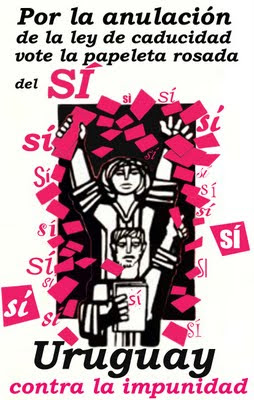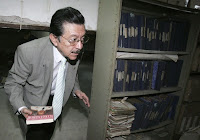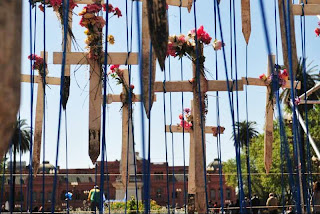It was a mixed good news/bad news story which came out of Federal Court No. 5 in Buenos Aires yesterday, where Jorge Olivera Róvere was sentenced to life imprisonment for 116 cases of illegal deprivation of liberty and 4 cases of aggravated homicide.
During the dictatorship, Olivera Róvere was the 'right-hand man' of the late
Guillermo Suárez Mason and in charge of the detention centres "El Banco", "El Olimpo" and "Automotores Orletti", among others.
First, let's look back at the trial itself which was examined in an excellent article for
truthout a few weeks ago:
Though no witnesses identified Róvere as their torturer or kidnapper, Crous has argued that Róvere was an essential component of the "anti-subversive" operations in Buenos Aires, coordinating activities of the police, the navy and the army.
[...]
Norberto Giletta opened the defense with a charged, full frontal assault on victims in the case, telling the court that "we are here today because of leftist forces, national and international." To discredit the testimony against Róvere, he said that the vast majority of witnesses belonged to or had family members in "terrorist" organizations. The defense's theory is that it was legal for Róvere to detain suspected terrorists. They argue that he was not aware of, or was not responsible for, what happened to his detainees - torture and execution - once they were out of his hands. They summarized the prosecutor's case as prosecuting their client for "wearing a uniform."
Argentina's Dirty War: How to Defend an Accused Mass Murderer? (truthout)
On Friday, he was indeed convicted alongside retired colonel Bernardo José Menéndez; but three other accused - Teófilo Saá, Humberto Lobaiza and Felipe Alespeiti - were acquitted. Naturally, the families of the victims and human rights organisations were not satisfied with this and there were angry scenes at the courthouse at the end of the nine-month trial.
According to Gerardo Fernández of CELS (Centre for Legal and Social Studies), "there was enough evidence to convict them all... the acquittal of the ex-area chiefs is a step backwards in comparison to the criteria applied in the Trial of the Juntas" [in1985].
Moreover, even the two convicted are still out on the streets as the sentence won't be applied until the case is finalised.
In his closing statement, Olivera Róvere maintained that the 1970s were a time of war which was started by "terrorism, even attacking democratic government". The culprits were "terrorists sent by Moscow to subjugate the country". However, he also denied having "received or given orders which infringed on human rights".
Here is a news round-up on the subject - there does, however, seem to be some confusion on the actual facts, including the spelling of Olivera Róvere's name, his age, and the exact number of his convictions, so be aware of this:
Mas absueltos que condenados (Pagina/12)
Condenan a perpetua a un general que fue mano derecho de Suarez Mason (Diario Los Andes)
Argentine general jailed for life for rights abuses (Inquirer)
Argentine: life sentence for 2 repressors, 3 acquitted (The News International)
Condenan a cadena perpetua al represor Jorge Olivera Rovere (Clarin)
















